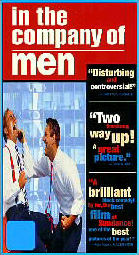
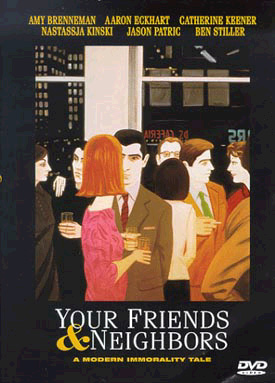
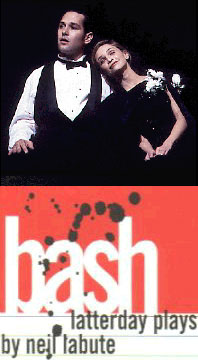
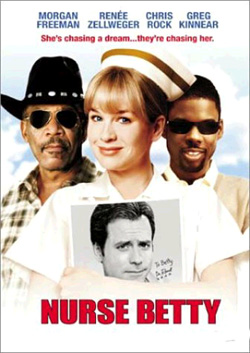
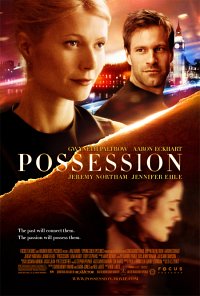
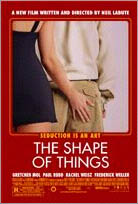


|

|

|

|

|

|
The man who would become one of his generation's most talked about (and most controversial) dramatists was born in Detroit, Michigan in the early 1960s. LaBute grew up in the Spokane, Washington area. He developed an intense interest in theatre and film that was evident even in high school. A Latter-day Saint high school guidance counselor mentioned the film school at Brigham Young University, and scholarships available to go there. LaBute applied to BYU and was awarded a "minority scholarship" reserved for non-Latter-day Saints.
While at BYU LaBute joined the Church of Jesus Christ of Latter-day Saints - in 1981. His religious affiliation has become one of many things that baffle and intrigue interviewers and critics. The raw and brutal nature of so many LaBute characters is completely opposite the stereotyped image that many entertainment writers have of Latter-day Saint people and writing.
LaBute graduated from Brigham Young University with a degree in Theater. He then studied at the University of Kansas and New York University. While enrolled in the Graduate Dramatic Writing Program at NYU he attended the Sundance Institute's Playwrights Lab. He also received a scholarship to study writing and drama at the Royal Academy of London. Biographical information accompanying "In the Company of Men" at Cannes notes:
While a student, he spent several months on a literary scholarship at London's Royal Court Theatre, the spiritual home of the "angry young men" who jolted British culture out of its complacency in the late 1950s, and also of many of the most provocative British plawyrights of recent years. He acknowledges the influence as crucial.
In 1993 LaBute received the AML (Association for Mormon Letters) Award for Drama for his play "In the Company of Men," which he produced at Brigham Young University in December, 1992. It was adapting this film to the screen that propelled LaBute to cinematic fame.
In 1997 LaBute entered "In the Company of Men" into the renowned Sundance Film Festival. He shot the film near his home in Fort Wayne, Indiana for a paltry $25,000. When he was invited to screen it at the Sundance Film Festival he did the post-production work. (The film eventually cost $250,000.) In the lead role he had cast Aaron Eckhart, his friend and fellow student from BYU. LaBute was so surprised when he won the Filmmakers Trophy at Sundance that when he arrived at the podium to accept his award, he snapped a photograph of himself. He said that if he didn't take a picture, nobody would believe he actually won.
"In the Company of Men" immediately ignited controversy as it was seen and reviewed at other film festivals and in theaters. The film portrays two co-workers who find themselves bored in a small city on a business trip. To amuse themselves they decide to romance a young deaf woman, and then do everything possible to destroy her emotionally. Many who saw it were shocked by the level of cruelty and inhumanity displayed by the men in the film. Some branded the picture "misogynistic," while others considered it profoundly feminist in outlook.
"In the Company of Men" proceeded to win major awards or nominations at the Deauville Film Festival, the Independent Spirit Awards and the Thessaloniki Film Festival. The Society of Texas Film Critics Awards awarded LaBute their Best Original Screenplay award, and the influential New York Film Critics Circle named it the year's Best First Film. In addition to the awards that LaBute won as writer and director, the film garnered Aaron Eckhart the Golden Satellite Award for Outstanding New Talent, and the Independent Spirit Award for Best Debut Performance. Stacy Edwards was nominated for an Independent Spirit Award -- for Best Female Lead.
With awards and buzz from critics, "In the Company of Men" far exceeded expectations at the box office. The film earned $2.9 million in domestic box office receipts: over 10 times what it cost to make.
With the success of his first feature film, LaBute was able to make a feature film with a much larger budget: $5 million. "Your Friends and Neighbors" was once again based on his own screenplay. And once again he cast Aaron Eckhart in a lead role. But this was an ensemble cast, featuring a frank and shocking look at the interlocking love lives of three couples. The other main cast members were Amy Brenneman, Catherine Keener, Nastassja Kinski, Jason Patric, and Ben Stiller.
"Your Friends and Neighbors" outperformed LaBute's first film, taking in over $4.7 million at the U.S. box office. The Online Film Critics Society Awards nominated the film for Best Ensemble Cast Performance, and nominated Jason Patric for Best Supporting Actor. Patric also received a Golden Satellite nomination. The film brought LaBute a Golden Seashell nomination at the San Sebastian International Film Festival.
Critics were once again impressed with the film, and saw it as being in the same vein of brutally honest, unconventional filmmaking as LaBute's first film. As a hot independent film director, LaBute found himself was profiled in the television documentary "Independent's Day" (1998), alongside other critically acclaimed young directors such as Kevin Smith and Steven Soderbergh.
LaBute's next feature was his first studio picture: "Nurse Betty." It was also the first film he directed based on another writer's material. The story and original screenplay was written by John C. Richards. LaBute reworked the screenplay some, but not enough to receive billing as a co-screenwriter.
"Nurse Betty" is a comedy, albeit a very dark one. It was a departure for LaBute, in tone as well as budget, but is still unmistakably a LaBute film. The all-star cast includes Morgan Freeman, Renee Zellweger, Chris Rock, Greg Kinnear, Crispin Glover and (once again) Aaron Eckhart.
"Nurse Betty" earned LaBute a Golden Palm nomination at the Cannes Film Festival (the most prestigious film festival in the world). It also earned its lead actors Zellweger and Freeman a bevy of awards and nominations from film festivals and critics circles. Zellweger received a Golden Globe Award for Best Actress in a Comedy, and this was considered a breakout performance for her.
"Nurse Betty" had a budget of $24 million, larger than LaBute had ever worked with, but economical for a studio picture with such a star-studded cast. The film grossed over $25 million in U.S. box office ticket sales alone, making it a financial success. "Nurse Betty" was also the highest-grossing non-animated, non-documentary film ever made by a Latter-day Saint director, surpassing Kieth Merrill's "Windwalker" (1980). (Six documentaries or animated films have earned more.)
Also in 2000, an Off-Broadway play written and directed by LaBute was filmed and shown on Showtime. "bash: latterday plays" (which has also been titled "bash: a gaggle of saints") is actually a set of three plays about violent and highly disturbed individuals who happen to be Latter-day Saints. The earliest form of this play was published as Bash: A Remembrance of Hatred and Longing, in the December 1995 issue of Sunstone. LaBute called it a play about essentially good people who do some very bad things. The actors, who played multiple characters, were Ron Eldard, Paul Rudd and Calista Flockhart. It was Flockhart's performance that attracted considerable attention, as this was her first major stage role since becoming one of television's hottest stars on the popular series "Ally McBeal."
The Latter-day Saint references confused some New York critics and audience members. (New Yorkers aren't known to have a very developed understanding of Latter-day Saint culture.) While some Latter-day Saint critics appreciated the play, others were annoyed. LaBute said that he had simply written about the people and culture he knows well, and that the plot was not inherently LDS-oriented. Realizing that the effectiveness of the piece was diminished by the distracting LDS references, LaBute actually removed the LDS references and made the characters more "generic" when he staged the show in London.
Soon after completing "Nurse Betty," LaBute commenced work on "Possession." Many observers considered this a startling departure for the typically hard-edged filmmaker. This film is an adaptation of the popular romance by A.S. Byatt. The 1990 novel Possession won the Booker Prize and is widely studied on college campuses. The story is set in two time periods: Two contemporary literary scholars discover that the Victorian era writers they each study once had a passionate love affair. As they track down the previously unknown history of these writers, they develop a surprising relationship themselves.
LaBute was very fond of the book, and actively pursued the opportunity to direct the film version. Given LaBute's previous work, Byatt thought him a strange choice, but after listening to his ideas she felt he was best suited for the task.
Academy Award winner Gwyneth Paltrow ("Shakespeare in Love", 1998) and LaBute's frequent collaborator Aaron Eckhart were cast as the contemporary scholars, while Jeremy Northam and Jennifer Ehle were cast as the Victorian writers. The film switches between the two time periods. When "Possession" opened in 2002 it received largely positive reviews, but further confounded critics because the sincere, even sentimental love stories at its center seemed so different from LaBute's past films and plays.
LaBute's latest feature film, the same-titled big-screen adaptation of his critically acclaimed stage play "The Shape of Things," premiered at the Sundance Film Festival held in Utah in January 2003. The story in the play and film has been described as something of an "inversion" of "In the Company of Men." It features a woman who reshapes a museum guard as an "art project."
LaBute was a member of the Church until late 2004 or early 2005, when his membership formally ended. Prior to the formal end of his Church membership, LaBute had been disfellowshipped in response to some negative media publicity about the Church, associated with his play "bash: latterday plays" (1999). Disfellowship is a probationary state, and meant that LaBute was still a member of the Church, but was barred from speaking in worship services and was barred from participating in certain rituals, such as partaking of the sacrament. During much of the time he was disfellowshipped, LaBute continued to attend Church meetings, continued to refer to himself as a practicing Church member, and was referred to in media reports as an "active" or "devout" Latter-day Saint.
In an interview in January 2005, LaBute said of his Church membership: "I don't imagine there would be a way in which Mormonism couldn't inform my work, because I've been around it in some fashion longer now than I was not around it. Throughout that time, no doubt, there were moments when I was closer to it than I am now. But even during that period of, say, twenty years it went in degrees: I was devout, or not as devout, or struggling. All of those things, any choice you make, informs what you write."
Until recently, LaBute lived in Fort Wayne, Indiana with his wife (a family therapist) and two children. LaBute and his wife were recently separated.
Web page created 7 December 2001. Last modified 19 January 2005.